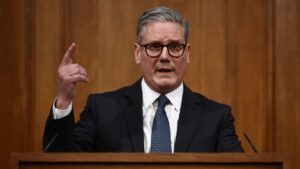Climate action will be central to ‘all’ foreign policy, David Lammy says
Campaigners welcome the UK’s return to the world stage on the issue, but warn words must be backed with cash and action.

Climate action will be central to “all” foreign policy, David Lammy has said as the new government seeks to rebrand the UK’s international image.
The foreign secretary used his first major speech in his new role to address the climate and nature crises and how they intersect with geopolitics, conflict and insecurity.
“Action on the climate and nature crisis will be central to all the Foreign Office does,” Mr Lammy said.
“This is critical given the scale of the threat, but also the scale of the opportunity.”
The new Labour government is trying to reinvigorate UK energy policy, and re-establish the country’s position as a global leader on climate action – prominent when the UK hosted the COP26 climate conference in Glasgow, but watered down under then prime minister Rishi Sunak.
Its flagship energy policy is to reach 100% clean electricity – which means replacing coal and gas with renewables and nuclear – by 2030.
The target is not drastically different to – but five years sooner than – the Tories’ 2035 target.
The government now wants to use this target as a way to lobby other countries to decarbonise faster.
The Foreign Office said it would do this via a new “Global Clean Power Alliance”, which will attempt to increase funding for other countries to “leapfrog” fossil fuels in favour of clean power systems.
However, as yet the alliance has no fresh funding nor other members, though the Foreign Office sees it as more of a diplomatic vehicle to form closer ties with other countries on climate.
The government has pledged to spend £11.6bn between 2021-22 and 2025-26 to help developing countries adapt and respond to climate change, and Mr Lammy said that “remains our ambition as we undertake the spending review”.
Asked by Sky’s science and technology editor Tom Clarke how he was going to deliver on these goals with so little money to spend, the foreign secretary said he was “right” to raise the issue of money in light of the alleged £22bn fiscal “black hole” ministers claim they inherited from the Tories.
“It’s important that I and others within government continue to make the case as, of course, government and [chancellor] Rachel Reeves, make those difficult choices about what our priorities are in a tough fiscal environment,” he added.
“But I think it’s important to remember that this agenda is fundamental to UK growth, and therefore we should keep hope alive.”
International climate campaigner Harjeet Singh, of the Fossil Fuel Non-Proliferation Treaty Initiative, said the move to form an alliance “sends a clear signal that climate and nature are back on [the UK’s] agenda”.
But “true leadership goes beyond speeches and announcements”, he said, calling for concrete action, cash and technologies to help developing nations phase out fossil fuels and cope with climate impacts.
Read more:
Mega-tsunami caused Earth to vibrate for days
Chance of La Nina cold weather emerging

Keep up with all the latest news from the UK and around the world by following Sky News
About £2trn a year will be needed every year by 2030 to pay for developing countries to bring about the changes needed, according to a report co-written by UK economist Lord Nicholas Stern.
That financial black hole for developing nations is not only down to the size of economies, but because they are often saddled with debt, are paying for climate impacts they usually did not cause, and because it is more expensive for them to borrow money.
A row is intensifying over who should pay for future climate measures in these countries, which tend to have contributed little to climate change but are suffering more, according to analysis by thinktank IIED.
A current commitment by rich polluting countries to give developing nations $100bn (£75.7bn) a year in “climate finance” expires in 2025.
The next funding pot is due to be agreed at the United Nations climate summit COP29 in Azerbaijan in November, but preliminary talks have been embroiled in disputes.
Nations have been unable to agree who should pay in and who should be on the receiving end, nor the annual sum.
Mr Lammy will also reinstate the UK climate envoy role – axed by Mr Sunak – and create a new nature envoy.
He also indicated the government wants to reverse the controversial Tory cut to the UK’s foreign aid budget which was slashed from 0.7% of GDP to 0.5%.
However, he may have a hard time making his case to the chancellor and prime minister ahead of the budget on 30 October – which the latter has warned will be “painful”.



